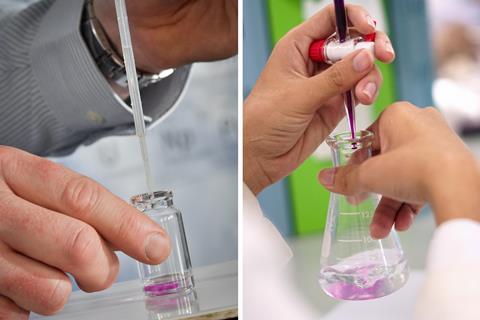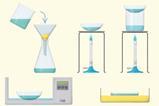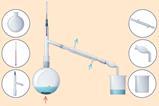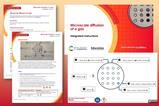Scale up your students’ skills and confidence in practicals with these strategies and tips

Practical work is a cognitively demanding part of students’ chemistry learning. The demands of manipulating equipment and making, recording and interpreting measurements and observations can be high. Therefore, I often start a practical sequence with microscale experiments, which can provide quicker, safer and more focused activities. However, practical questions in exams often look a lot like the ‘required’ practicals supplied by exam boards. So how do I progress from microscale to full-scale practicals?
Practical work is a cognitively demanding part of students’ chemistry learning. The demands of manipulating equipment and making, recording and interpreting measurements and observations can be high. Therefore, I often start a practical sequence with microscale experiments, which can provide quicker, safer and more focused activities. However, practical questions in exams often look a lot like the ‘required’ practicals supplied by exam boards. So how do I progress from microscale to full-scale practicals?
Building confidence
With more complex practicals, such as titration and rates of reaction, I plan a careful sequence of tasks that build up my students’ confidence and competence over time. Alongside the microscale and full-scale practicals, I use simulations and demonstrations. A recent ASE research study highlighted the importance of high-quality practical demonstrations and questioning.
In an article on making practical work more effective, I showed a progression of tasks that I use to build up to acid-base titration. This involves revising the use of indicators, then carrying out a microscale titration based on measuring reaction masses rather than volume. Next comes a key lesson, the introduction to new equipment, where the focus is how to work with burettes and volumetric pipettes. This gives my students the time and space to understand and practise with the equipment, without having to also attend to data collection and analysis. When it finally comes to the titration investigations, my students have gained some practical confidence and competence to build on.
I use a similar sequence when we tackle rates of reactions. Once we have covered key theoretical concepts, I use simulations to give my students some time to develop their understanding of how variable change affects outcome.
With more complex practicals, such as titration and rates of reaction, I plan a careful sequence of tasks that build up my students’ confidence and competence over time. Alongside the microscale and full-scale practicals, I use simulations and demonstrations. A recent ASE research study (bit.ly/3TeS39G) highlighted the importance of high-quality practical demonstrations and questioning.
In an article on making practical work more effective (rsc.li/3Tf7Gh8), I showed a progression of tasks that I use to build up to acid-base titration. This involves revising the use of indicators, then carrying out a microscale titration based on measuring reaction masses rather than volume. Next comes a key lesson, the introduction to new equipment, where the focus is how to work with burettes and volumetric pipettes. This gives my students the time and space to understand and practise with the equipment, without having to also attend to data collection and analysis. When it finally comes to the titration investigations, my students have gained some practical confidence and competence to build on.
I use a similar sequence when we tackle rates of reactions. Once we have covered key theoretical concepts, I use simulations to give my students some time to develop their understanding of how variable change affects outcome.
Making connections
My students’ first hands-on activity is a microscale variation of the classic ‘disappearing cross’ reaction. Hydrochloric acid reacts with sodium thiosulfate to produce colloidal sulfur, turning the reaction mixture cloudy. The microscale version is quicker, cheaper and safer than the larger scale version that appears in some UK exams and suggested practicals. Students gain a first-hand appreciation of the connection between concentration and rate of reaction from this activity.
Next, we use the same set-up, this time changing the temperature of the reaction. We use hot water from kettles, a simpler way of changing the temperature than swirling flasks in hot water baths. Using the same set-up reduces the number of new factors that the students need to think about. As with introducing burettes/pipettes before tackling full scale titration, I’m steadily adding the new, rather than all at once.
My students’ first hands-on activity is a microscale variation of the classic ‘disappearing cross’ reaction. Hydrochloric acid reacts with sodium thiosulfate to produce colloidal sulfur, turning the reaction mixture cloudy. The microscale version is quicker, cheaper and safer than the larger scale version that appears in some UK exams and suggested practicals. Students gain a first-hand appreciation of the connection between concentration and rate of reaction from this activity.
Next, we use the same set-up, this time changing the temperature of the reaction. We use hot water from kettles, a simpler way of changing the temperature than swirling flasks in hot water baths. Using the same set-up reduces the number of new factors that the students need to think about. As with introducing burettes/pipettes before tackling full scale titration, I’m steadily adding the new, rather than all at once.
Then, we turn our attention to the new complex equipment for rates experiments. We spend a lesson specifically looking at handling and using gas syringes and collecting gas over water in a measuring cylinder. Both these set-ups are fiddly, and the students need time to develop and practise their new skills. In the runup to this lesson, I tell students why we’re spending a lesson on learning this new technique. I explain the importance of having some fluency with equipment before using it in a live practical. I use the analogy of practising set pieces on the sports field before playing matches. Some focused training makes for better skills during matches.
How to upscale
Here’s a summary of the overall progression:
- Set a homework task of a video showing the necessary equipment, along with a Microsoft Forms or Edpuzzle short quiz.
- Articulate what you’re doing and why, with an explicit step-by-step demonstration of the techniques in the lesson.
- Repeat the demonstration, calling on students to articulate and explain the steps.
- Ask students to practise it, with individual or group feedback as needed.
How to upscale
Here’s a summary of the overall progression:
- Set a homework task of a video showing the necessary equipment (bit.ly/3TclfOE), along with a Microsoft Forms or Edpuzzle short quiz.
- Articulate what you’re doing and why, with an explicit step-by-step demonstration of the techniques in the lesson.
- Repeat the demonstration, calling on students to articulate and explain the steps.
- Ask students to practise it, with individual or group feedback as needed.
We generally use the reaction of marble chips and hydrochloric acid to produce the gas. We can extend this to a quick investigation on the effect of surface area on rate of reaction to embed both practical skills and theory.
Finally, we bring all the aspects together in a large-scale investigation. I set the task of investigating the reaction between magnesium and hydrochloric acid. I give my students the freedom to choose the independent variable (concentration of HCl or temperature of HCl) and method of gas collection (gas syringe or over water). If I’ve got a particularly strong group, I might introduce the idea of determining initial rates from the data.
By spreading out the practicals and demonstrations over several lessons, my students get multiple chances to develop their skills and understanding. Their cognitive load is managed by moderating the number of new ideas introduced in each lesson. They consolidate their understanding over time by retrieving ideas from memory; sometimes explicitly through questioning, sometimes implicitly through the tasks. The locus of control moves progressively from me to them as their confidence and competence grows.
We generally use the reaction of marble chips and hydrochloric acid (rsc.li/3MHNG4l) to produce the gas. We can extend this to a quick investigation on the effect of surface area on rate of reaction to embed both practical skills and theory.
Finally, we bring all the aspects together in a large-scale investigation. I set the task of investigating the reaction between magnesium and hydrochloric acid. I give my students the freedom to choose the independent variable (concentration of HCl or temperature of HCl) and method of gas collection (gas syringe or over water). If I’ve got a particularly strong group, I might introduce the idea of determining initial rates from the data.
By spreading out the practicals and demonstrations over several lessons, my students get multiple chances to develop their skills and understanding. Their cognitive load is managed by moderating the number of new ideas introduced in each lesson. They consolidate their understanding over time by retrieving ideas from memory; sometimes explicitly through questioning, sometimes implicitly through the tasks. The locus of control moves progressively from me to them as their confidence and competence grows.














No comments yet